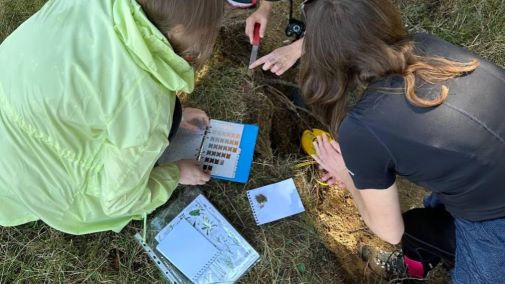Virtual field trips are helping war-torn Ukraine and its universities continue to deliver essential field education that will be vital to support the country's recovery from conflict and mitigate and adapt to the ongoing climate crisis, according to a new study.
 Resilient education: soil profile characterisation using a Munsell Soil Colour Chart
Resilient education: soil profile characterisation using a Munsell Soil Colour Chart
With access to parts of the country almost impossible, cutting edge online tools are supporting the delivery of Higher Education that will be essential in Ukraine's post war recovery.
Resilient education: The role of digital technology in supporting geographical education in Ukraine has been published in the Transactions of the Institute of British Geographers journal.
Recovery efforts
The study explores how field education, in particular, is being challenged by the war but makes clear how important it will be as part of a post war recovery effort.
The research shows how the University of Salford, University of York and other institutions around the UK can collaborate with Ukrainian academics to support the delivery of field education at a time of war.
Vital skills
Graduates with field skills will be vital for post-war efforts to map and tackle contamination, reverse damage to ecosystems, mitigate and adapt to the ongoing climate crisis and support a green recovery.
Dr Liz Hurrell, Senior Lecturer in Environmental Geography at the University of York, said: "Ukrainian academic staff are showing extraordinary resilience and innovation, it is a real privilege to work with such talented and determined academics. They are utilising digital technology to continue to provide a field education despite being unable to physically visit key sites. This field education is so important because graduates with field skills will be absolutely key to understanding how the war is impacting environments within Ukraine."
Partnership working
Virtual field trips and partnerships between The University of Salford, the University of York and Ukrainian researchers have taken many forms, including:
- Online workshops with academics in Ukraine using augmented knowledge platform ThingLink. This innovative idea led to virtual field trips being created by staff and students in locations that might be considered unsafe due to conflict.
- Ukranian academics have made innovative use of tools such as Google Earth and landform photography to develop unique student learning opportunities. Through collaboration with UK academics, field technique videos have been created and shared to supplement this field learning.
- The creation of a summer school saw the bringing together of ideas on how digital tools could be used to create virtual field trips. Academics collaborated on technical ideas such as VR headsets and making best use of collaborative projects in Google Earth and ThingLink.
- Creativity is woven through virtual field trips, with students and academics working together to co-create videos using digital platforms and staying connected through forums.
The University of York, the University of Salford, V. N. Karazin Kharkiv National University, Ukraine and the University of Suceava, Romania, partnered to deliver a summer school in Romania last year, funded by the Central European Initiative, to map these techniques and share best practice for virtual field trips.
Overcoming challenges
It offered an amazing opportunity for Ukrainian academics, including from Lviv, Kyiv and Chernivtsi, to come together to highlight the educational challenges the war has presented and share how they have overcome these challenges.
Dr Simon M Hutchinson, Associate Professor at the University of Salford, is an advocate for virtual field trips and was lead author on the new paper. He explained: "My dream is to have a platform that hosts virtual field trips that have been contributed by various people. This wouldn't just benefit Ukraine, who seem keen on any access to resources to help them teach, but other people and institutions as well. These virtual field trips have the potential to revolutionise how people teach and learn geography."
Sharing successes
More can be done to grow the impact of virtual field trips beyond conflict zones, rolling out learnings to other places around the world.
The paper ends with a call for universities and funders to further facilitate, through time and financial resourcing, teaching and learning collaborations between UK, and other countries, and Ukrainian universities. This will ensure high-quality higher education and vital field skills continue in Ukraine.
Overcoming challenges
Dr Hurrell added: "It is now the third year of the war, and a time when the conflict is possibly going to escalate - so it has never been more important to support our fellow academics in Ukraine who are continuing to provide Higher Education against all the odds.
"Not only do virtual field trips play a role in war-torn areas, they can also transform the work of academics here in the UK by addressing equality, diversity and inclusion and sustainability concerns. Simply put, these tools can mean less travel and lower carbon emissions."
Dynamic software
Virtual field trips are made possible through a dynamic approach to using high-tech software in a collaborative way.
Louise Jones, Chief Community Officer, ThingLink, welcomed the research and said: "At ThingLink, we're incredibly proud to be supporting the education community in Ukraine who are showing such determination and creativity in the face of challenges. Virtual field trips are a powerful example of how immersive learning tools can keep essential education going, even when physical access isn't possible.''
Training specialists
She added: "It's inspiring to see how our technology in partnership with universities are helping students and academics stay connected and build skills that will be vital for Ukraine's recovery. This work shows just how much we can achieve when we collaborate and innovate together."
Dr Kateryna Borysenko, from Karazin Kharkiv National University, said: "War affects every aspect of society, but higher education is the foundation for rebuilding a country. It is important to understand how to ensure access to quality education, even in such circumstances, as it contributes to the training of specialists for post-war reconstruction."











